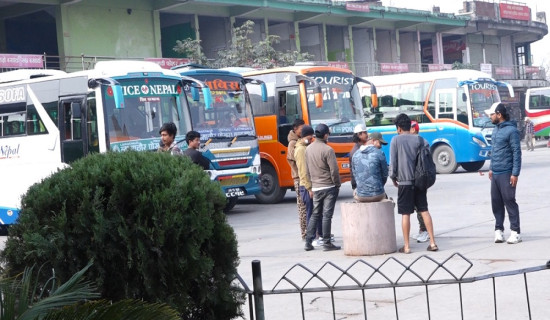- Tuesday, 3 March 2026
Making Electoral Process Frugal
When asked what the most beautiful aspect of democracy is, one would likely cite the election. Transitioning from the era of tyrannical Rana regime to this freedom to vote in a republic, the impoverished hoi polloi struggling to make their ends meet face similar kinds of livelihood challenges now as they did in the past. It should be sounding quite surprising that the election process is complex that hinders common people from coming to the leadership position. Though the role of public voting is highly revered, manipulation of its dark side is really rotting away the hard-earned beauty of republicanism and here is an alternative to minimise that rot.
As the election is announced or even before that, party cadres race to get tickets of candidacy. The purported basis of awarding a ticket is the nonpareil contribution to the party but in today’s context, it is loud and clear that there is money involved if a stranger makes a lateral entry into the party, those with fat purse get a token for fighting in the election. Hence, as a party determines its candidate, it is not unlikely that the candidate has already spent hundreds of thousands of rupees that he ought to recoup later.
Exorbitant cost
There is also an exorbitant cost on the part of the government when it comes to elections. For a small budget country like us, whose almost 40 per cent of national budget is sourced from debts and grants, are not the expenses made in the elections too much of a financial burden to afford?
But we have a solution for that and the name of the solution is sortition, in which a random selection of one candidate is carried out from a pool of listed applicants. Someone may readily ridicule me when I propose sortition as a better alternative to voting, especially in this changing era when democracy is thought to be the best and common political practice worldwide wherein an elected candidate gets a chance to govern. We may well take a risk for more positive changes to wipe out many blemishes for one good thing, for sortition is by no means an inferior practice.
Dating back to the 6th Century BC in Athens political positions were filled by sortition, which finds its applicability well even today in America’s court where jurors are selected randomly from a pool of qualified citizens. In many instances, democratic lottery is the well-practiced device to cut down corruption from the roots.
The Election Commission (EC) can make definite eligibility criteria for different tiers of candidates to formally solicit the applications. We can first skim applicants in four different aspects: education, experience, knowledge and situational tasks. The assessment can be done by EC, Public Service Commission or by forming an independent body of experts under EC. For example, to be eligible for the candidate of House of Representatives (HoRs), at least a bachelor degree of education and two years of formal work experience in the social sector would be mandated.
The applicants who meet these criteria will be furthered to sit for a written examination on the general knowledge about current affairs, history, geography, laws and constitution. The last section would be an interview to check the intuition and readiness for certain kinds of unprecedented situations. The remaining candidates after crossing these stages are comparably competent for the post of HoRs from which we will have to sort out one lucky winner through a lottery. This nourishes public attitude to seek skills and knowledge instead of joining politics as a full-time loyal follower.
Understandably, big party candidates flood money to the have-nots in electioneering far beyond the limit — set by EC — as they siphon funds from the haves. Thus, the candidate is under an obligation of returning the money or favour to those who funded him. Nonetheless, sortition completely exterminates the expenditure of the election not only of the competitors but also of the government. It, thus, proactively controls the socio-political hazards of inflation, national trade-deficits, corruption, cronyism and favoritism.
Traits of leaders
Additionally, there are particular traits of leaders we elect through public voting. They seem to be vociferous, narcissistic and constantly hungry for power. The leader now in power had been a leader since childhood in school groups or play teams. This progressive development of exercising power since childhood has already corrupted the individual as he feels himself the ‘chosen one.’ Whereas, the randomly selected person attributes his leadership solely to the luck and thus does not exude the pride that undermines the values of others. They also tend to listen to others before coming to the decision. These leaders are best fit for a thriving democracy like us like never before.
Therefore, to finally minimise the exorbitant ballot expenditure in each 5-year cycle, we can first start practicing sortition from a small social unit like school management committee, district coordination committee and after analysing their repercussions, we can adopt it to the mass election which will ensure a new face in the leadership arena. For those who contend that sortition deflowers one of the beauties of hard-earned democracy, we can at least propose this approach to by-elections and snap election as a litmus test.
(Adhikary is Banepa based writer, ravinems@gmail.com)
















